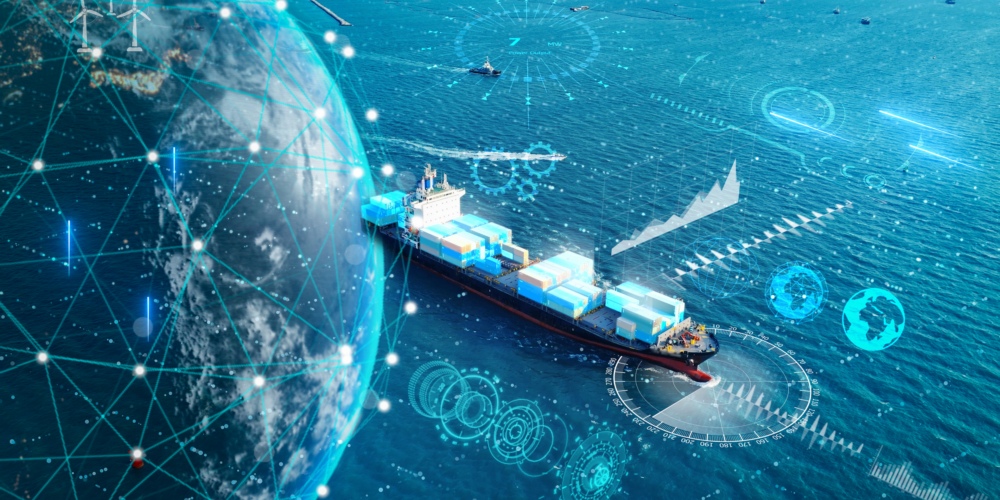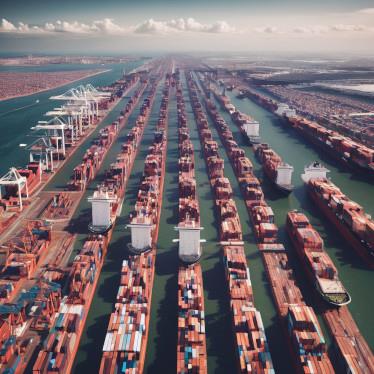
Approximately 90% of global trade is conducted through maritime transportation, making the industry a critical component of the global economy. Technological advancements, environmental regulations, and innovations in logistics are continuously shaping the evolution of maritime trade. Here are the latest trends and innovations in global maritime trade:
1. Sustainability and Eco-Friendly Approaches
Environmental concerns are driving sustainable practices in maritime transportation. The International Maritime Organization (IMO) is introducing new regulations aimed at reducing carbon emissions. Key developments include:
- Low-carbon fuels: Alternatives like LNG, methanol, and hydrogen are gaining traction.
- Emission-reduction technologies: Exhaust gas cleaning systems (scrubbers) and carbon capture technologies are reducing environmental impact.
- Eco-efficient ships: Innovative hull designs and energy-saving engines minimize fuel consumption.
2. Autonomous Ships and Artificial Intelligence
Autonomous ships and AI-powered systems are revolutionizing maritime trade. Autonomous vessels reduce human intervention, enhancing safety and operational efficiency. Artificial intelligence is being used for:
- Route optimization: AI analyzes weather and sea conditions to suggest the most efficient routes.
- Predictive maintenance: Sensor data predicts equipment failures and optimizes maintenance schedules.
- Cargo management: AI optimizes load distribution to enhance stability and fuel efficiency.
3. Smart Ports and Digitalization
Smart port technologies are at the forefront of digital transformation in maritime trade. Ports are leveraging IoT, AI, and big data analytics to improve efficiency and speed. The benefits of smart ports include:
- Real-time tracking: Cargo movements and vessel traffic can be monitored in real-time.
- Automation: Robotic systems streamline loading and unloading operations.
- Energy savings: Smart energy management systems support eco-friendly practices.
4. The Impact of E-Commerce and Fast Logistics Solutions
The rapid growth of e-commerce is increasing demand for smaller and faster deliveries in maritime transport. This has led to innovations such as:
- Smaller vessels: Small-scale container ships meet the need for frequent deliveries.
- Multimodal transportation: Integration of sea, land, and rail transport ensures efficient door-to-door solutions.
- Blockchain technology: Enhances transparency and security in supply chains, streamlining e-commerce logistics.
5. Innovative Cargo Ships and Technologies
Technological advancements are making cargo ships more efficient. Key innovations include:
- Smart sensors: Monitor ship performance and optimize fuel consumption.
- Renewable energy use: Solar panels and rotor sails help meet energy needs.
- Autonomous cargo management: Advanced robotic systems enable faster and more efficient cargo handling.
6. Cybersecurity and Digital Risk Management
The digitalization of the maritime industry brings increased cybersecurity risks. Measures being taken include:
- Cybersecurity protocols: Specialized security software is developed for ports and ships.
- Blockchain-based solutions: Ensure secure storage and sharing of shipping documents.
- Training programs: Crews and port personnel are educated on recognizing and responding to cyber threats.
7. Developments in Global Trade Corridors
Infrastructure projects in key trade regions are accelerating. Examples include:
- Expansions of the Panama and Suez Canals, enabling the passage of larger vessels.
- Arctic shipping routes, offering alternative pathways as ice caps recede.
- China’s Belt and Road Initiative, strengthening maritime trade connections between Asia and Europe.
Global maritime trade is rapidly evolving, driven by technological innovations and sustainable solutions. Autonomous ships, smart ports, and eco-friendly practices are injecting new dynamism into the industry. These innovations not only improve operational efficiency but also aim to reduce the environmental footprint of maritime trade, paving the way for a more sustainable future.


